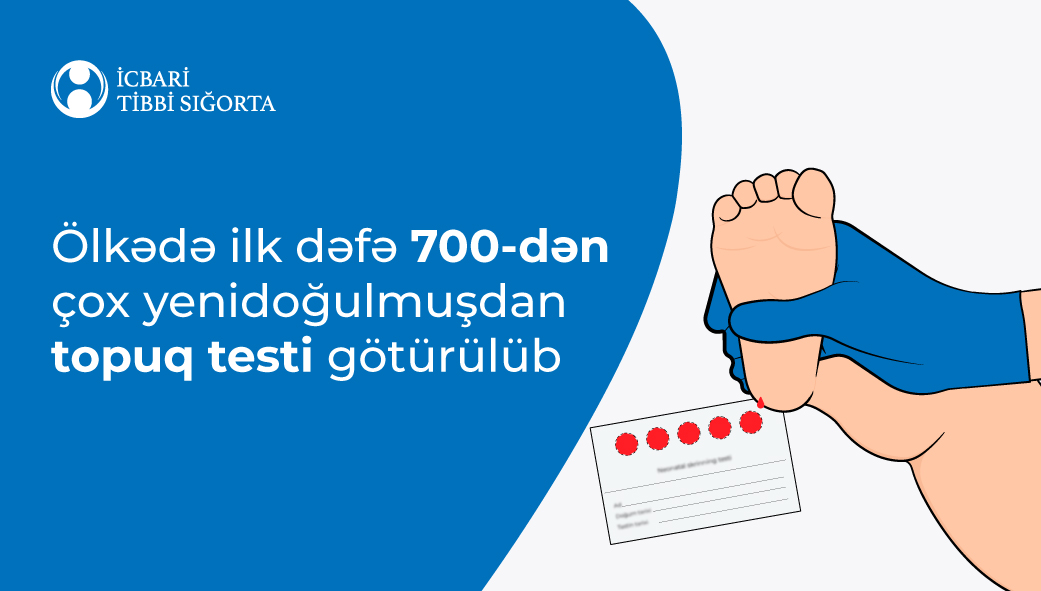10 June 2022 11:35
Newborn screening tests performed for the first time in the country for the early diagnosis of hereditary diseases
As a result of neonatal screening tests conducted in state health facilities since May of 2022 for the early detection of congenital and hereditary diseases among newborns, no disease was detected in any baby. Newborn screening tests were performed on more than 700 children so far. It should be noted that this examination – called the "heel prick test" in the medical literature – is carried out as part of the "State Program for Improving Maternity and Child Health for 2014-2022" and "Action Plan for 2020-2025 years on the Implementation of the Children's Strategy," both implemented by the State Agency on Mandatory Health Insurance since 2021.
According to Rustam Huseynov, head of department at the Scientific Research Institute of Obstetrics and Gynecology and an expert-specialist of the Ministry of Health, the heel prick test is important for the early detection of hereditary diseases: "Some congenital diseases do not have any symptoms or their clinical symptoms are not specific in the first days after the birth of a child. With the application of the heel prick test, it is possible to detect these diseases at an early stage and provide timely treatment. This, in turn, helps to decrease the number of children with disabilities and mortality rates related to genetic metabolism disorders. The test is intended to be taken in all maternity hospitals. The process has already begun at the Republican Perinatal Center, the Republican Clinical Hospital named after academician M.A.Mirgasimov, and the Sumgayit Perinatal Center. Employees of the institute conduct trainings for doctors and nurses of relevant state health facilities."
With the recommendation of WHO, newborn screening is included in the list of tests that are necessary for children. The heel prick test is performed by taking a blood sample from the heel of newborns. The blood sample is taken two days after birth from children who were born on time and who started feeding; it is taken after one week from children who were born prematurely. Samples taken in maternity hospitals are sent to the Scientific Research Institute of Obstetrics and Gynecology for laboratory examination. The laboratory of the institute is able to detect five hereditary diseases from samples. This includes phenylketonuria, galactosemia, cystic fibrosis, adrenogenital syndrome, and hypothyroidism.
It should be noted that the special reagents used in the laboratory for the detection of hereditary diseases at the Research Institute of Obstetrics and Gynecology are supplied by the State Agency on Mandatory Health Insurance.
News
İcbari tibbi sığorta ilə 182 000-dən artıq doğuş aparılıb
16 July 2024 11:10
Diz oynağının endoprotezləşməsində İsveçrə istehsalı protezlərdən istifadə olunur
12 July 2024 10:42
Kəskin orta otitin cərrahi müalicəsi icbari tibbi sığorta ilə qarşılanır
09 July 2024 11:11
Tiroidektomiya əməliyyatı icbari tibbi sığorta ilə ödənişsizdir
05 July 2024 10:25
İcbari tibbi sığorta ilə qasıq yırtığı açıq və laparoskopik üsulla icra olunur
01 July 2024 15:18
İcbari Tibbi Sığorta üzrə Dövlət Agentliyinin nümayəndə heyəti Yaponiyaya işgüzar səfər edib
28 June 2024 10:51
İcbari tibbi sığorta ilə 540 splenektomiya əməliyyatı icra olunub
24 June 2024 14:52
Zaur Əliyev Goranboy şəhərində vətəndaşları qəbul edib
21 June 2024 17:00
İcbari tibbi sığorta uşaqlığın çıxarılması əməliyyatını qarşılayır
21 June 2024 10:57
Agentlik, TƏBİB və Ankara Universiteti üçtərəfli anlaşma memorandumu imzaladı
14 June 2024 14:49










